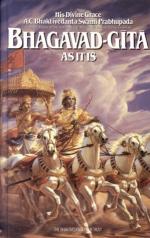
|
| Name: _________________________ | Period: ___________________ |
This test consists of 5 short answer questions, 10 short essay questions, and 1 (of 3) essay topics.
Short Answer Questions
1. What is Krishna among bodies of water?
2. What does Sanjaya say would resemble Krishna's revealed splendor?
3. What do those whose faith is sattvic worship?
4. What does Krishna charge Arjuna to cultivate?
5. Among mountains what is Krishna?
Short Essay Questions
1. What instructions does Krishna give Arjuna at the beginning of this chapter?
2. How does Arjuna begin this chapter?
3. Who does Krishna say are the most established in yoga?
4. What are the limits to Krishna's divine power?
5. Why does Arjuna apologize to Krishna?
6. Who does Krishna say sees truly?
7. What are Krishna's instructions for Arjuna if he finds he cannot still his mind?
8. What is the relationship between Purusha and prakriti?
9. With what kind of person is Krishna in love?
10. What kind of food do those ruled by each of the gunas eat?
Essay Topics
Write an essay for ONE of the following topics:
Essay Topic 1
Toward the end of the Bhagavad Gita, Krishna shifts his attention to those souls with "demonic tendencies."
1) Describe the attitudes of souls of this nature. How are they different from the attitudes Krishna has previously promoted?
2) Discuss what Krishna teaches concerning the destiny of souls of demonic nature.
3) What are the "three gates" to self-destruction? How may these be avoided?
Use specific examples for all the above.
Essay Topic 2
At the beginning of the first chapter, Dhritarashtra asks Sanjaya to tell him what happened on the field of dharma where his family gathered to fight the Pandavas. The story of the Bhagavad Gita then unfolds for the reader through the mouth of Sanjaya.
How do we understand the story differently because it is narrated by Sanjaya, and not Krishna or Arjuna? How does this choice make the reader feel? In what ways does this narrative device enhance the effect of the story? Discuss citing specific examples.
Essay Topic 3
Seeing Arjuna's despair prior to battle, Sri Krishna rebukes him saying such weakness in a time of crisis is unworthy of him. Krishna urges Arjuna to rise up with a brave heart and destroy the enemy.
Describe Arjuna's response in detail. What is the logic of Arjuna's argument? Upon what sources does Arjuna rely to support this argument? To what conclusion does the argument lead? Discuss while citing specific examples.
|
This section contains 851 words (approx. 3 pages at 300 words per page) |

|




